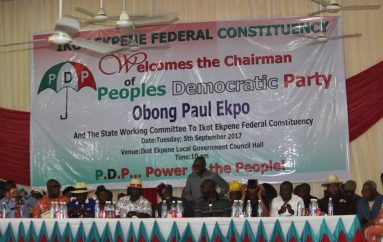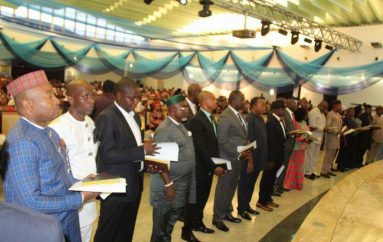
Need for Akwa Ibom Indigenous Banks, Financial Institutions
The role of banks, indigenous or foreign is generally the same, but the degree and enthusiasm, which they play the banking role and their commitment to investing in the development of the local economy, are usually not the same.
For instance, financial experts have pointed out that all the foreign banks that came to Nigeria to open shop as early as 1882 were concerned about the well-being of their home economy.
Besides, they operated on hired or leased property. While foreign banks’ support for indigenous businesses was anything but complimentary, they were always ready to support local branch businesses of their home economy.
In matters of employment, they reserved the executive positions for their indigenes and recruited Nigerians as middle and junior management staff.
Nigerian business men who detested above prejudices in the operations of foreign banks in Nigeria came together to establish their own banks to cater for their peculiar needs.
This reason also informed the establishment of commercial banks by state governments. The National Bank of Nigeria, NBN, was a Nigerian bank established in February 1933. It came under the control of the Western Nigerian government in 1961 and after the creation of states in 1976, the Western States of Nigeria assumed joint ownership. For more than three decades, spanning much of the 1950s to early 1980s, it emerged as one of the largest indigenous banks in Nigeria and along with the old Bank of the North and African Continental Bank, it was described by Pius Okigbo in 1981 as one the big three indigenous banks in the country. The bank met the financial needs of businessmen in western Nigeria.
In the South Eastern State, now Cross River and Akwa Ibom States the government of Brigadier –General Udoakagha Esuene incorporated the defunct Mercantile Bank of Nigeria in the mid 1970s to serve the interest of the local economy.
The Mercantile Bank supported the government of Esuene in the establishment of industries, such as Calabar Cement Company, CALCEMCO; Champion Breweries, Uyo; Asbestonit, Flour Mills, Qua Steel, Eket; Metropolitan Hotel Calabar and Qua River Hotels Eket, Sunshine Battery among others.
Few years ago, former Governor Godswill Akpabio, who acknowledged the numerous benefits of a state – owned bank urged Akwa Ibom Concerned Professionals, a group of professionals from the state based outside Akwa Ibom to take a critical look at the banking industry so that they can assist in establishing state- owned financial institutions.
He lamented that the Cooperative Development Bank earlier owned by the State government was acquired as a result of reforms in the banking sector.
Similarly, a financial expert and lead consultant of Medallion Consulting, Port – Harcourt, Mr. Mfon Enyong, also made a case for the establishment of a state government-owned financial institution.
He recalled in a paper he presented at Investors’ Forum in Uyo, to mark the 20th Anniversary celebration of Prudential Cooperative Microfinance Bank that it was during the era of Mercantile Bank of Nigeria Ltd that Cross River State experienced milestone industrial development supported by the bank.
” The bank supported the state government in the establishment of industries. Cross River State government with support from Mercantile Bank of Nigeria established Quality Ceramics, Asbestonit, Sunshine Batteries, Qua Steel Manufacturing Company, Biscuit Company, Pamil and Cross River Breweries. The bank also pioneered the finance of car loans to for civil servants of that era.
” Besides Mercantile Bank, indigenes of old Cross River State later floated a bank-the Cooperative Development Bank (CDB), which catered for the needs of the cooperators, state government and other people,”
This position was also that of Mr. Udobong Ekpo, a former banker , who said that the Mercantile Bank provided linkages for the different sectors of the economy of South Eastern State and encouraged high level of specialization, expertise and a conducive environment for the implementation of various economic policies of government.
Akwa Ibom few microfinance banks, Akwa Ibom is not much of a player in the banking and financial services industry in Nigeria. Of the 24 deposit money banks, Nigerians have at least 95 per cent share holding in 16, while government has 100 per cent shares in three; 100 per cent ownership of three and a significant foreign ownership of two.
” Besides contributing to socio-economic development of their states, it must be stated that even the personnel distribution in those banks are appropriately skewed. In the area of specialised insured institutions, Akwa Ibom has 13 microfinance banks and a mortgage bank- Akwa Savings and Loans Ltd as the only indigenous banks to service the needs of the clientele of these specialist institutions,”
He pointed out that the availability of financial capital is a requisite for the rapid development and transformation of any economy, provision and efficient management of the scarce resources.
This, he said, means that banks play a vital role by making their vast financial resources available for financing and promoting development.
”Apart from acting as an agent for mobilisation of savings, banking institutions play a dynamic role in the area of infrastructural and industrial development, capacity building, manpower development, stimulation of investment and channeling of such investments to priority sectors of the local economy.”

 List of Newly Elected Chapter Officers
List of Newly Elected Chapter Officers  Inauguration of Newly Elected Ward Executive Officers
Inauguration of Newly Elected Ward Executive Officers  Gov Emmanuel Dedicates Victory To God, Akwa Ibom People
Gov Emmanuel Dedicates Victory To God, Akwa Ibom People  Paul Ekpo: A Harvest Of Mercurial Performance
Paul Ekpo: A Harvest Of Mercurial Performance 


